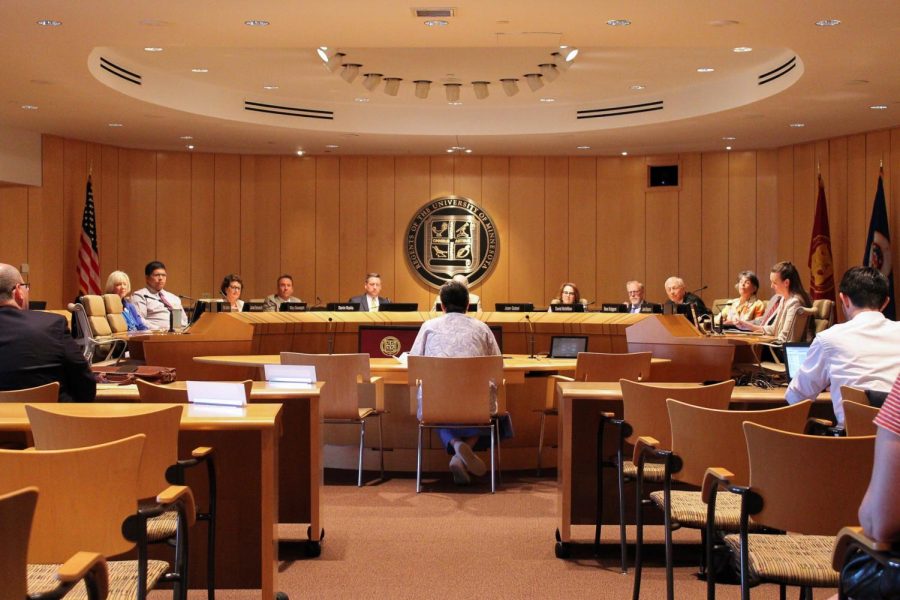The University of Minnesota Board of Regents discussed new scholarship opportunities and plans for two academic health sciences projects at their meeting Friday.
University President Joan Gabel also announced changes to the University’s indoor mask requirements. Starting March 21, masks will only be required in classrooms and instructional laboratories, healthcare settings, on transit and in settings where masks are required because of hazardous conditions.
New scholarship proposals
The University is requesting $60 million for student financial support through a supplemental budget request to the state legislature. The University requested a total of $935.6 million from the state this year.
If the request is approved by the state legislature, the $60 million would go toward expanding two scholarship opportunities for students, said Julie Tonneson, the University’s vice president for finance and operations and budget director, at the meeting.
Thirty million dollars will go toward enhancing the U Promise Scholarship Program. The current program allows students to receive scholarships if their family household income is $120,000 or less.
The new expansion would target students from middle income families, allowing students from families earning up to $160,000 a year to receive scholarships.
The University recently expanded the scholarship with the Promise Plus Program, which offers tuition-free education for families making $50,000 or less. The University also announced in November it will offer full tuition grants to students of Minnesota’s Tribal Nations whose families make less than $75,000.
“Clearly, attentiveness to our middle income students needs to be a priority for our financial aid strategies moving forward,” said Robert McMaster, vice provost and dean of undergraduate education, at the meeting.
The Greater Minnesota scholarship program would require the other $30 million from the University’s supplemental budget request. The program would provide scholarships to every Minnesota resident entering their first year at the Duluth, Morris, Rochester or Crookston campuses.
Students would receive $4,000 to $5,000 during their first year and an additional $1,000 to $2,000 for the next three years. The goal is to attract students to these four campuses and increase retention, McMaster said.
While the board generally supported these budget requests, some regents said they were concerned creating more scholarships may not be the best long-term solution to decreasing student debt.
“I appreciate that we’re asking for this in the supplemental budget,” Regent Darrin Rosha said at the meeting. “I just don’t know that it has nearly the impact it would if we were applying that to lower the tuition burden … and I would hope that in the future, that’s where our focus is.”
If the University used $30 million of this funding to lower tuition, rather than expanding scholarships, the current tuition rate would decrease by about 7%, according to Tonneson.
“Low tuition is the best form of financial aid,” Regent Steve Sviggum said at the meeting. “I hope we get our legislative request, but do understand, nothing is free … and our tuition that we charge at the University of Minnesota could be 7% less for all students.”
Academic health sciences projects
The board discussed the creation of an Academic Health Center in the Duluth Medical District and a Health Discovery Hub on the Twin Cities campus. The board approved both projects in the University’s revised state capital request in December, but they are still dependent on the state legislature’s approval of the funding.
Both projects are designed to expand educational opportunities in the medical field at the University and provide better medical care to Minnesota’s rural areas, said Jakub Tolar, vice president for clinical affairs and the Medical School dean.
“These projects intend to transform new and innovative spaces for classrooms, labs, research [and] spaces that allow us to cultivate talent and ultimately expand the University of Minnesota’s capacity to provide world-class healthcare for all Minnesotans,” said Myron Frans, senior vice president of finance and operations, at the meeting.
The Academic Health Center in Duluth would be located near St. Luke’s Hospital and Essentia Health and include new space for classrooms and specialty labs, Tolar said. The estimated total cost would be $18 million.
If the funding is approved in the 2022 state legislative session, the project would take nearly four years to complete.
The Health Discovery Hub on the Twin Cities campus will focus on facilitating rural clinical trials and integrating research and clinical care in neuroscience.
The proposal includes the construction of a new building to complete the hub. The new center will be built near the Health Sciences Education Center. The estimated total cost is $252 million.
If the state legislature approves the funding, the design for the hub would take about three and a half years to complete.
“This is a once in a generation opportunity to really make a difference,” Regent Ruth Johnson said at the meeting. “This is a really important initiative that I strongly support.”
Regents said they supported these proposals and believe the state will approve this funding for the University.
“I think that the legislature should all get behind this,” Regent Doug Huebsch said at the meeting. “I don’t know why they wouldn’t. This is the main thing that they should be concerned about, the health and safety of citizens.”


















